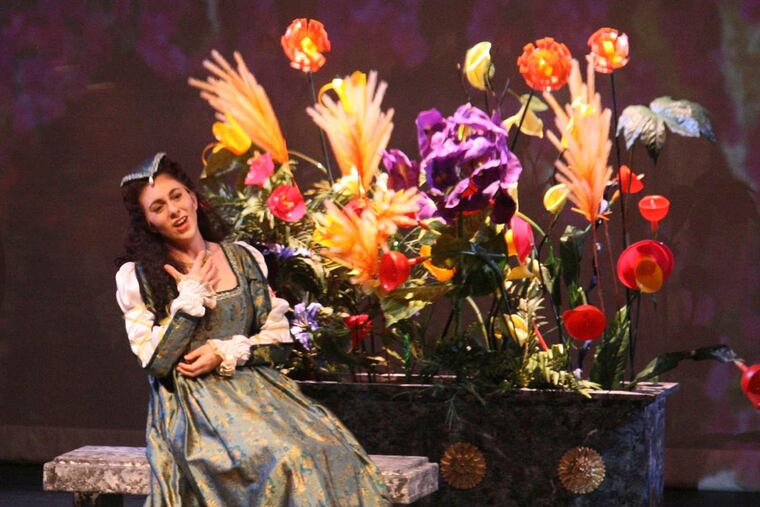Local opera company struggling - and struggling - to pay its artists
The jungle drums began in September, weeks after the August 2015 season of the former Center City Opera, now rechristened Vulcan Lyric. They portended so much trouble that some opera administrators might think twice about repeating the experience.

The jungle drums began in September, weeks after the August 2015 season of the former Center City Opera, now rechristened Vulcan Lyric. They portended so much trouble that some opera administrators might think twice about repeating the experience.
The 28 performances over 18 days at the Prince Theater were a mixed success. One of the best of the four productions, Tom Cipullo's Glory Denied, about a Vietnam War veteran, had played to as few as 20 listeners. Special discounted tickets sold well, but the discounts cut into revenue. Vulcan Lyric founder/director Andrew Kurtz concedes that, in retrospect, with productions opening on top of each other, quality suffered.
The result: Many of the artists who made it happen weren't paid at the end of the festival. More than four months later, about 27 remain unpaid. Freelance Philadelphia musicians say this is fairly unusual. Because they worked on more than one production, many of them are out at least $2,000.
"I am also a voice teacher, and I lost much more income from not teaching than Vulcan Lyric was offering to pay me," stage director John N. Peters wrote in an email. "But I saw it as an opportunity because there is a dearth of professional opera work in Philadelphia. . . . My wife, who is a costume designer, claims that Kurtz still owes her $500 for costumes he rented from her years ago."
French-hornist Kristina Gannon, who makes her living as a freelance player and teacher, calls her lack of payment "devastating . . . as a teacher who relies on income to pay the bills and pay for supplies for my students and as a performer who relies on blind faith that payment will be provided for services rendered."
She speaks for many in calling the situation "inexcusable."
About the only ones who don't want to be quoted are those suing the company who have been advised by legal counsel to stay quiet.
Lack of payment, for them, feels even more galling when visiting Kurtz's Facebook page, showing him in Florida with the Gulf Coast Symphony (which he directs) with his pretty wife and new baby. Vulcan Lyric board president Perry Ecksel has assured the unpaid artists Vulcan Lyric isn't holding out on anybody; the money isn't there.
Contacted Wednesday, Kurtz said: "This is torture for me. . . . I want to get everybody paid. And I want to be paid, too."
So that makes 28 unpaid artists.
Kurtz concedes to being a slow payer in the past, but, familiar with shortfalls, he says he was able to make good in a season whose productions were spread throughout the year. If his Rigoletto put him in the hole, the next production would bring in the money to cover it. The festival format of the Vulcan Lyric season didn't allow that.
Kurtz was ambitious. The three new operas were Glory Denied, Daniel Catan's Rappaccini's Daughter, and the Jeff Myers/Royce Vavrek opera Maren of Vardo: Satan's Bride. The season filled out with the Off-Broadway musical Heathers. Kurtz quotes statistics that the concentrated format seemed to have attracted ticket-buyers from 17 states, as opposed to the usual tristate area. Tickets sold to audiences under 30 were popular, but they went at a third of the usual price. Audience attendance - 49 percent - was well below the 60 percent projections.
Several factors contributed. With the Prince Theater's changing ownership, what was meant to be a July season was pushed into August - when many Philadelphians are on vacation. Marketing efforts were also delayed. Not having done this kind of season, Kurtz underestimated the cost of stagehands. His staff was stretched so thin the leading soprano for one opera was seen working at the box office for another.
It showed on stage, at least in the opening performances critics saw. In The Inquirer, Toby Zinman observed sound problems in Heathers: "It's even harder to figure out why any character does what he/she does, especially with the head mikes cranked up high."
Wrote Matthew Westphal in his Inquirer review of Rappaccini's Daughter: "They simply have to do better than this."
Part of opera culture involves a certain amount of optimistic thinking: Whatever the financial situation looks like at the outset, donors will rescue the company at the other end. But last year, Gotham Chamber Opera in New York dissolved upon discovery of a sizable deficit that key parties say they forgot about. Compelling performances, though, can help keep the faith. Superstar conductor Valery Gergiev concedes that, at the beginning of his now-famous White Nights Festival in Russia, the money wasn't there, "but we did it anyway." When Beverly Sills took over the New York City Opera, her husband looked at the books and told her to close the company. (She didn't.)
Kurtz's gamble didn't work out: "Our board doesn't have deep pockets." A fairly trim $400,000 budget had a $100,000 shortfall.
An appeal went out for a 2016 season, but Kurtz says those plans aren't likely to materialize. He doesn't want to stage a new season when the last one still isn't paid for. With board president Ecksel credited with shepherding the Media Theatre out of a large deficit, Kurtz's most emphatic message to the unpaid musicians is this: "We know what we're doing."